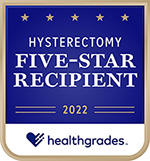Minimally Invasive Gynecologic Surgery
Stony Brook Medicine’s Minimally Invasive Gynecologic Surgery Team provides comprehensive, multi-disciplinary care to patients with benign conditions. We utilize the latest advances in surgical and medical treatments in order to provide the best, individualized care to our patients.
Our team of skilled and experienced surgeons have been specially trained to perform both routine and complex minimally invasive surgeries. These highly trained doctors use laparoscopic procedures including robotic, vaginal, or mini-laparotomy techniques. These involve small incisions, reduced blood loss, less scarring, and a faster recovery time. Frequently, patients can go home the same day of their surgery and often be back at work in less than 2 weeks.
Laparoscopic versus Robotic
While both laparoscopic and robotic equipment enable physicians to perform minimally invasive procedures, they each have their own unique capabilities. Laparoscopic tools are rigid, with cameras that provide two-dimensional views for the physicians. Laparoscopic procedures are generally used for more routine surgeries. Robotic-assisted surgical tools, on the other hand, offer more flexibility and a three-dimensional view, making them appropriate for more complex procedures.
Our Team

Xun (Julie) Lian, MD, FACOG
Clinical Assistant Professor in Obstetrics, Gynecology & Reproductive Medicine
Director, Minimally Invasive and Robotic Gynecologic Surgery Division
Program Director of Minimally Invasive and Robotic Surgery Fellowship
Specialty: Obstetrics & Gynecology
Subspecialty: Minimally Invasive Surgery and Robotic Gynecologic Surgery, Well Woman Gynecology, Gynecologic Ultrasound

Sara Kim, MD, FACOG
Clinical Assistant Professor in Obstetrics, Gynecology & Reproductive Medicine
Specialty: Obstetrics & Gynecology
Subspecialty: Minimally Invasive Surgery and Robotic Gynecologic Surgery, Well Woman Gynecology, Gynecologic Ultrasound

Caitlin Waters, MD, FACOG
Clinical Assistant Professor in Obstetrics, Gynecology & Reproductive Medicine
Specialty: Obstetrics & Gynecology
Subspecialty: Minimally Invasive Surgery and Robotic Gynecologic Surgery, Well Woman Gynecology, Gynecologic Ultrasound

Christine Dwyer, PA
Specialty: Gynecology

Richard Sosulski, NP
Specialty: Gynecology
In 2022 SBUH received a 5-star rating for Hysterectomy procedures from Healthgrades. |
Conditions We Treat
-
Fibroids
-
Abnormal uterine bleeding
-
Ovarian cysts
-
Endometriosis
-
Chronic pelvic pain
-
Abnormal pregnancies: ectopic, cesarean scar pregnancies, interstitial
-
Cesarean scare defects
-
Cervical insufficiency/Abdominal cerclage
Expertise and Experience in Minimally Invasive Gynecologic Surgery
What sets Stony Brook Medicine apart in this arena is the experience and training of its physicians. These specialized surgeons have completed additional formal training in minimally invasive and robotic-assisted surgery either through a fellowship in Gynecologic Oncology, which typically takes three to four years, or through a Minimally Invasive Gynecologic Surgery Fellowship that generally takes two to three years. Stony Brook doctors also train other surgeons on both a national and international basis. And while the average OB/GYN in New York State performs five to six hysterectomies annually, the physicians in the Minimally Invasive Gynecologic Surgery Department at Stony Brook perform more than 100 each year.
Even though minimally invasive surgeries are more commonplace now, there are still situations and conditions that may require traditional open surgery. An example would be when a tumor has grown too large to be removed by minimally invasive methods. However, more and more frequently, open invasive surgeries in this field are becoming a thing of the past.
Through the Enhanced Recovery After Surgery (ERAS) program, a multi-disciplinary team (including anesthesiologists, surgeons, nurse practitioners, physicians, assistants, nurses, pharmacists and social workers) will work with you to ensure that you are getting the best care, both before and after any surgical procedure. Our ultimate goal is to have you back to your normal lifestyle as quickly as possible.
For more information about general OB/GYN surgery, call (631) 444-4686, or for information about gynecologic oncology surgery, call (631) 444-2989.


